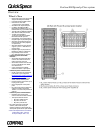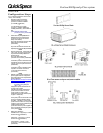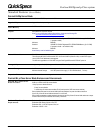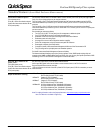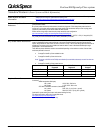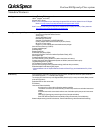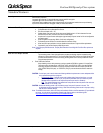
QuickSpecs
ProLiant BL20p and p-Class system
DA-11411 World Wide — Version 4 — September 19, 2002 7
Standard Features
OS Support
Microsoft
Windows
2000 Advanced Server
LINUX
(Red Hat
and SuSE
)
Microsoft .NET Server
Note: For a more complete and up-to-date listing of supported OS’s and versions, please visit our OS Support
Matrix at: ftp://ftp.compaq.com/pub/products/servers/os-support-matrix-310.pdf
.
Note: For an up-to-date listing of the latest drivers available for the Compaq ProLiant BL p-Class, please see:
http://www.compaq.com/support/files/server/us/index.html
.
Intelligent Manageability
Integrated Lights-Out Advanced (iLO)
Virtual Text and Graphical Remote Console *
Virtual Floppy *
Virtual Power Button Control
Dedicated LAN Connectivity
Automatic IP Configuration via DHCP/DNS/WINS
Industry Standard 128-bit Secure Sockets Layer (SSL) Security
IML and iLO Event Logging
Support for 12 user accounts with customizable access privileges
Automatic Server Recovery-2 (ASR-2)
Compaq Insight Manager 7
Redundant ROM
Remote Flash ROM
ROM Based Setup Utility (RBSU)
Advanced Configuration and Power Interface Specification Ready (ACPI)
Server Health Logs
Compaq Redundant Power Supply Utility
Pre-Failure Warranty (covers processors, as well as hard drives and memory)
Compaq Interconnect Switch Management System and Utilities (interconnect switch option)
Integrated Management Log (IML)
Off-Line Backup Processor capability
Dynamic sector repairing and drive parameter tracking (with Smart Array controllers)
Redundant/adaptive load balancing NIC Support
* Advanced features such as Graphical Remote Console and Virtual Floppy are included with the BL p-Class
server.
Availability
Power redundancy: Redundant AC feeds into power enclosures, redundant DC feeds from power enclosure to
server blade enclosures, 1 + 1 redundant power supplies
Two hot-plug SCSI hard drive bays and integrated RAID (Smart Array 5i) on every server blade (Battery-backed
write cache is optional.)
Redundant ROM on each server blade
ECC Memory
Interconnects Switch Availability
Hot-plug and hot- remove with configuration retention capability
Two network connections per server blade bay (four NICs total) routed to two redundant interconnect
switches
Redundant inter-switch communication with two sets of redundant uplink ports per each interconnect
switch
IEEE 802.1D Spanning tree protocol support for loop-free path redundancy
Static IEEE 802.3ad (EtherChannel compatible) trunking with automatic port load balancing
Network adapter teaming (network fault tolerance, transmit load balancing, switch-assisted load balancing)



